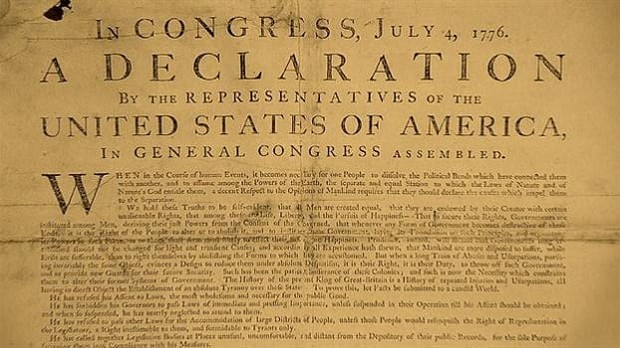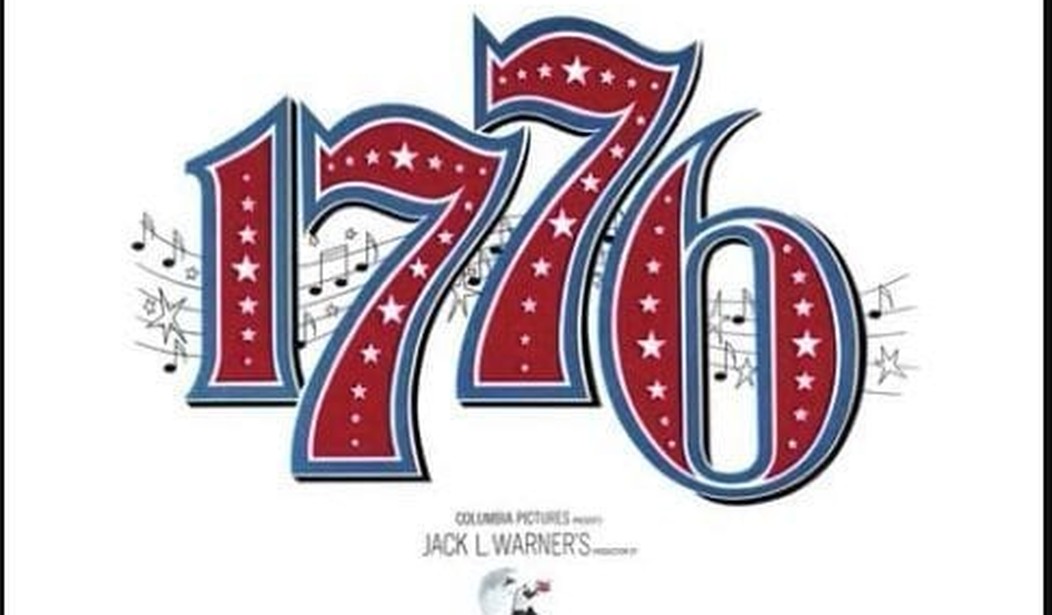
Timing is everything — or so they say. This past Sunday, I had the opportunity to see “1776” (the musical) at the Muny (St. Louis’ outdoor musical theater.) We have season tickets and I usually enjoy the shows they bring each summer. This year, the only title which really caught my eye was “1776.” I didn’t know much of anything about the show. I’d read David McCullough’s like-titled masterpiece but recognized the musical didn’t derive from that despite the obvious subject matter overlap. A quick scan of the songs failed to reveal any which rang a bell with me. Still, as a history buff and someone who’s always thought the founding of our nation both inspiring and fascinating, this one was a must-see for me.
I wasn’t quite certain what to expect. I’ll confess, I was pleasantly surprised. The story and dialogue were intriguing, engaging, often humorous, sometimes even bawdy. The musical numbers left a little to be desired — none of them were particularly catchy, though having followed up Sunday evening’s theater visit with a viewing of the movie Thursday night, I now have this earworm, thank you very much:
Recognizing that this was a dramatization of the events surrounding the signing of the Declaration, not a documentary, I thought the show still provided an informative and entertaining peek into a momentous event. One that seemingly rankles many Americans on an increasingly virulent basis.
If you’d asked me 10 — perhaps even 5 — years ago whether I thought the founding of our nation and signing of our Declaration of Independence controversial (other than, perhaps, to a few assorted grudge-holding Brits), I’d have thought it quite odd. The notion that fellow Americans might take issue with it would have been unfathomable. What’s to dislike about the freakin’ Declaration of Independence?! Please note: I say this as a former liberal/diehard Democrat. I didn’t become a conservative — or right-leaning moderate depending on whose ire I’m incurring — until my mid-thirties. A child of the ’60s, ’70s, and early ’80s, I nevertheless was raised loving my country, the ideals upon which it was founded, and the story of its founding. I was proud to be an American. And that wasn’t a political statement/sentiment — or, at least, not a partisan one. I never was under the illusion that we were perfect or immune to criticism. But even at my most leftward leaning, I absolutely adored and appreciated “the land of the free and the home of the brave.” (Side note to AOC: “Home of the free” will suffice, as well, particularly if you’re singing this song:)
So imagine my surprise (I should really get over being surprised, I suppose), when the day following the enjoyable “1776” performance, I caught wind of #BetsyRossGate. As several of my colleagues have covered (here, here, and here), apparently, the flag adopted by the Second Continental Congress on June 14, 1777, (a/k/a “The Betsy Ross Flag”), offends the sensibilities of one Colin Kaepernick and thus mustn’t adorn Nike shoes. Sarah Rumpf reported on the flag kerfuffle here first:
Sneaker giant Nike is apparently willing to flush a significant amount of money down the drain, pulling back already manufactured shoes from retailers, all because Colin Kaepernick, the professional football player turned activist and Nike spokesman, complained the design was offensive.
Nike had designed a special patriotic version of their Air Max sneaker, the Air Max 1 USA, to go on sale this week for the Fourth of July. The shoe featured a bright red, white, and blue color scheme, and the original design of the American flag, as first designed during the Revolutionary War, on the heels.
That original flag design, with thirteen white stars in a circle representing the thirteen original colonies, is often referred to as the “Betsy Ross” flag, after the Pennsylvania woman who has been credited with sewing the very first one (the historical accuracy of this claim is in doubt, but that’s a separate issue — the flag design was indeed the first one America used).
Offensive? Say what now? The Wall Street Journal explained:
Colin Kaepernick reached out to Nike saying that he and others felt the Betsy Ross flag is an offensive symbol because of its connection to an era of slavery https://t.co/6Y2mIlbAuT
— The Wall Street Journal (@WSJ) July 2, 2019
Okay, well, pretty much the entire founding of our nation is “connect(ed) to an era of slavery.” Because, yes, slavery was, unfortunately, still a lawful practice — in much of the world — at that time. No, that doesn’t justify it morally and that fact isn’t something to be at all celebrated. But condemning the initial flag adopted by the country for that reason is peak wokeness-overkill.
Again, the U.S. isn’t perfect — far from it. Neither were its founders. (Neither was Betsy Ross, I’m sure.) In fact, that’s directly addressed in “1776”, as John Adams (an ardent opponent of slavery) lobbies to keep language Thomas Jefferson — yes, Jefferson — initially penned in the Declaration:
He has waged cruel war against human nature itself, violating its most sacred rights of life and liberty in the persons of a distant people who never offended him, captivating & carrying them into slavery in another hemisphere or to incur miserable death in their transportation thither. This piratical warfare, the opprobrium of infidel powers, is the warfare of the Christian King of Great Britain. Determined to keep open a market where Men should be bought & sold, he has prostituted his negative for suppressing every legislative attempt to prohibit or restrain this execrable commerce. And that this assemblage of horrors might want no fact of distinguished die, he is now exciting those very people to rise in arms among us, and to purchase that liberty of which he has deprived them, by murdering the people on whom he has obtruded them: thus paying off former crimes committed again the Liberties of one people, with crimes which he urges them to commit against the lives of another.
In the show, South Carolina delegate Edward Rutledge objects to the inclusion of the passage and warns he will vote against independence (spelling doom for the Declaration, given the agreed-upon unanimity requirement) if it is left in the document. Adams, distraught, then debates the matter with Benjamin Franklin:
Dr. Benjamin Franklin : John? I beg you consider what you’re doing.
John Adams : Mark me, Franklin… if we give in on this issue, posterity will never forgive us.
Dr. Benjamin Franklin : That’s probably true, but we won’t hear a thing, we’ll be long gone. Besides, what would posterity think we were? Demi-gods? We’re men, no more no less, trying to get a nation started against greater odds than a more generous God would have allowed. First things first, John. Independence; America. If we don’t secure that, what difference will the rest make?
Again, I realize this is dialogue from a dramatization of the events — not a documentary or reenactment from the Congressional Record. But it struck me at the time (even before the Betsy Ross Flag controversy became a thing), that the stain of slavery was addressed so frankly in the play. Keep in mind, “1776” isn’t a recent work. It premiered on Broadway in 1969. It wasn’t glossed over. It was prominent — and painful to watch. As it should be.
History isn’t utopian and historical figures, including our founding fathers, aren’t demi-gods. They were “men, no more no less.” The current trend to willfully erase them and their deeds — both good and bad — by removing markers and symbols referencing them is probably well-intentioned in most instances, but so very ill-conceived. It lets the perfect be not just the enemy of the good but swallow it whole.
We should remember them. We should honor their accomplishments and learn from their mistakes.
Follow me on Twitter @SmoosieQ
Find my RedState archive here.














Join the conversation as a VIP Member